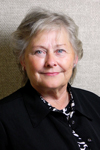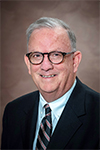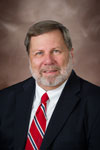Retiring UHV faculty member named professor emeritus
A longtime University of Houston-Victoria faculty member is retiring in August, and the UH System Board of Regents is honoring her with the title of professor emeritus.
Diane Prince joined the UHV faculty in 1974, a year after the university was founded, and now that she is planning to retire, she is proud to look back at how she has helped the university grow.
“UHV is fortunate to have employees like Dr. Prince, who have remained dedicated to its growth and excellence,” UHV President Bob Glenn said. “She has created a legacy at the university, and we will endeavor to continue her work in the years to come. I am proud to see her receive the honored title of professor emeritus.”
Prince will retire Aug. 31 from her position as a professor of education in the UHV School of Education, Health Professions & Human Development. At that time, she will receive the title of professor emeritus in recognition of her service for UHV, its students and the community during her 45-year career.
In addition to Prince, UHV has two professors emeritus: William O. Nesbitt and Robert F. Zawadzki. The UH System also recognized Don Smith as provost emeritus. The emeritus title is given to a faculty member by their colleagues to honor their service to the university and their profession. To earn the title of professor emeritus, a faculty member must have worked at least 10 years at the university and achieved the rank of associate or full professor. The special title is awarded through a process that requires a recommendation from the university, votes from the university’s faculty and Faculty Senate, and approval from the UH System Board of Regents.
“Diane Prince has played many important roles in UHV’s development,” said Fred Litton, dean of the school. “Her career is filled with examples of excellent leadership and a commitment to providing quality higher education to the region, including her support for technological advancement within the university and the creation of a faculty technology center at a time when computer technology was not in common use. This honor is well deserved, and I wish her the best as she prepares for retirement.”
During her time at UHV, Prince has held many roles. She first was hired as an assistant professor and eventually worked her way up to associate professor and then professor. She also served as chair of the education department for six years, certification officer for the education school, director of off-campus programs and interim dean of faculties, a position that later became the university’s provost and vice president for academic affairs. She also led the education school off-and-on for a total of 13 years as dean or interim dean.
One of the projects Prince is most proud of is the creation of a technology center for teachers on UHV’s campus in the 1980s. The center gave primary and secondary educators an opportunity to learn about and be tutored in new technology that could aid in their teaching. It also augmented the university’s teacher education faculty’s use of technology in classes. Prince helped write the grant request that would fund the center and help UHV get an early start on using technology in higher education.
“UHV’s leadership had a vision and knew technology would become an important part of the university’s future,” she said. “We were able to take that vision and turn it into reality through that center and other efforts that followed. I’m proud to have been part of the university’s efforts to stay on the cutting edge and take risks, whether it was offering online classes to people outside Victoria or establishing an instructional site in the Greater Houston area. UHV is a dynamic place.”
In addition to her work as a professor, Prince served in several volunteer roles on campus, including president of the Faculty Senate and president of the senate’s executive committee. She also was chair of two university president search committees and was part of a search committee for a UH System chancellor.
“I’m proud to be one of the people who played a part in laying the foundation for UHV,” Prince said. “Faculty governance was an important part of that foundation. I’ve probably chaired or been part of every faculty committee at the university, and I’ve had the opportunity to work with some amazing people.”
Some of those amazing people included Dorothy Alcorn, Kay Walker and Morgan O’Connor, former members of the UH System Board of Regents. Now as UHV continues to grow into a destination university, Prince can look back on the lasting friendships, rewarding experiences and many students who left an impression on her.
“All the hard work and effort put into my career at this great institution was worthwhile,” she said. “It’s wonderful to see how people are working to make UHV an even better place. There have been ups and downs, but every year was different, and I got to work through some unique and exciting challenges.”
After her retirement, Prince plans to spend time with her family. She also wants to travel and explore France. But through it all, she wants to stay connected to UHV.
“UHV is an important part of the community, and I hope it always stays true to its main purpose: the education and enlightenment of its students,” Prince said. “More than ever before, education is of the utmost importance, and it’s something we have to continue.”
The University of Houston-Victoria, located in the heart of the Coastal Bend region since 1973 in Victoria, Texas, offers courses leading to more than 80 academic programs in the schools of Arts & Sciences; Business Administration; and Education, Health Professions & Human Development. UHV provides face-to-face classes at its Victoria campus, as well as an instructional site in Katy, Texas, and online classes that students can take from anywhere. UHV supports the American Association of State Colleges and Universities Opportunities for All initiative to increase awareness about state colleges and universities and the important role they have in providing a high-quality and accessible education to an increasingly diverse student population, as well as contributing to regional and state economic development.
Lauren Hightower-Emerson
361-570-4342









